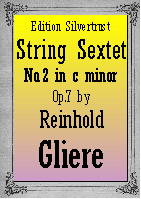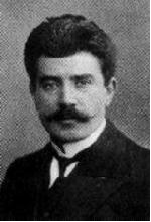Presents
Reinhold Gliere
 |
 |
Unfortunately, there are no recordings of this work. But you can get a good idea of the style of this Sextet by listening to the soundbites from his String Sextet No.3 which was composed the year after this work.
|
String Sextet No.2 in b minor, Op.7
Reinhold Gliere (sometimes spelled Glier 1875-1956) Gliere was born in Kiev where he began his first musical studies with the famous violin teacher Otakar Sevcik. He then went to the Moscow Conservatory where he studied with Sergei Taneyev, Anton Arensky and Mikhail Ippolitov-Ivanov. His superb compositional technique was quickly recognized by his teachers and he won several prizes for his early works, including his First String Sextet which took the prestigious Glinka Prize from a jury consisting of Rimsky-Korsakov, Glazunov and Liadov. Gliere, himself, taught at the Moscow and Kiev conservatories for nearly 40 years. Among his many successful students were Khachaturian, Prokofiev and Miaskovsky. Of Gliere's chamber music, the respected scholar and critic Professor Sabaneiev wrote:
" His chamber compositions show him to have been an absolute master of form, and a virtuoso in his control of the resources of musical composition and expression...He excelled as a melodist and his themes often reveal the contours of the Russian style which he understood so well. He had a masterly knowledge of the instruments and of their resonance, hence his chamber works are astonishingly rich and well written."
String Sextet No.2 in b minor, Op.7 dates from 1904. Wilhelm Altmann, perhaps the most famous chamber music critic of all, writes of it:
" This fine sextet is to be recommended for concert performance. The first movement begins with a short atmospheric Andante and is followed by an Allegro marked by its rhythms and rich themes. The development is full of surprises and the coda is extremely fine. The second movement, an Andante, has a noble folktune for its main theme, in some ways reminiscent of the famous Andante cantabile of Tchaikovsky’s first string quartet. In the middle there is a dramatic, agitated section. The spirited third movement, a Vivace, is very Russian sounding indeed whose appealing melodies are made even more impressive by the effective use of dynamics. The finale, an Allegro, opens with a dance-like main theme and is followed by a magnificent contrasting subject. Superb compositional technique is found in a powerful fugue and effective prestissimo coda.”
Out of print for more than half a century, we are pleased to reintroduce it and highly recommend it to professionals and amateurs everywhere.
|
(A) Parts (US & Non US Addresses) |
$39.95 |
|
|
(B) Parts & Score US Addresses |
$64.95 |
|
|
(C) Parts & Score NON US Addresses |
$79.95 |